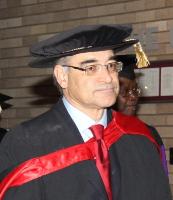
The adoption and implementation of the Research and Development Plan (RDP) in 2008/2009 has paid dividends if the Faculty of Humanities’ 2014 graduation numbers are any indication. The faculty saw a record number of students graduate with Masters and PhD’s, with the highest numbers coming from the Institute for the Study of English in Africa’s new Masters in Creative Writing Course, Psychology, School of Journalism and Media Studies, Sociology and Politics and International Studies.
Accounting for 40% of the entire student body, the Faculty of Humanities comprises 11 departments and two schools. Like many other South African universities, the Humanities at Rhodes has tended to lag behind the Sciences in terms of the outputs of postgraduate students and the publication of research, but efforts to reverse these trends is gaining momentum.
According to Professor Fred Hendricks, Dean of Humanities at Rhodes University, while there seldom is a causal relationship between plans and outcomes, the implementation of the RDP which involved a variety of mechanisms designed to encourage research within the faculty, could be a contributing factor in the record number of graduates.
One of these aims, Prof Hendricks explained, was to establish new research and postgraduate focus areas within the faculty, facilitated by generous grants from the Andrew W Mellon Foundation. The grants formed part of a comprehensive programme to promote research and postgraduate development, and to increase the numbers of women and black researchers in the Faculty and at Rhodes.
The focus areas include Critical Studies in Sexualities and Reproduction (Psychology and Political and International Studies), Visual and Performing Arts of Africa (Fine Art), The Media and Citizenship: Between Marginalisation and Participation (School of Journalism and Media Studies) and South African Literature (English).
Prof Hendricks said, the four research areas represented the four main disciplines within the faculty (arts, languages, social sciences and journalism) and enabled the university to carry out its strategic objective, as established in the RDP, of developing concentrations of research and expertise around certain topics to facilitate cooperation and engagement around these topics.
Given the expectation of creativity and theoretical contribution by the time of postgraduate study, Prof Hendricks said the difference in numbers of Science and Humanities graduates is somewhat understandable, but hopefully initiatives such as these have paid off.
According to Prof Hendricks, “even now the dominant mode of research within the Humanities is that of the lone researcher. Our efforts over the last few years have been aimed at complimenting that and to strive to facilitate levels of cooperation amongst colleagues dealing with particular topics. This helps to ensure cooperation between senior academics, postdoctoral students, and postgraduate students which all works toward encouraging research within the faculty,” he said.
The broad aims of the research conducted in the area of Critical Studies in Sexualities and Reproduction, among others, have been to analyse discourses concerning sexualities (sexual orientation, ‘adolescent’ sexuality) and reproduction/pregnancy deployed in public and private spaces; the range of taken-for-granted assumptions or absent traces that underpin interventions with respect to sexuality and reproduction; the governmental technologies of representation and intervention that achieve or undermine particular gendering, racialising and class-based effects, and lead to the continuation/discontinuation of sexual and reproductive health inequities; and the manner in which particular discourses regarding sexualities and reproduction are perpetuated or resisted in the everyday lives of men, women and their families.
Implemented in 2011, the Visual and Performing Arts of Africa programme focused on the research theme ‘The Audacity of Place’, which encouraged discussions about ‘place’ and ‘space’ in the discourse of Contemporary Art. The key aims of the team were to produce high quality research outputs in the form of publications, exhibitions and performances, to foster academic cooperation and collaboration by working on related topics, and to engage with society by addressing pertinent social, political and economic concerns in Africa today.
The Media and Citizenship: Between Marginalisation and Participation critically examines the ways in which the South African media realise their potential to contribute to the reconstruction and renegotiation of citizenship. The project seeks to establish to what extent South African media across a wide variety of outlets and expressions facilitates democratic participation and voice in the public sphere, especially for the most marginalised of citizens.
Prof Hendricks said the “unprecedented success” of the Masters in Creative Writing, located within the Institute for the Study of English in Africa (ISEA) has contributed to an increase in graduates for 2014 and he attributes this to the “dogged determination” of the coordinators and lecturers involved.
“This model is extraordinarily intensive and it has borne fruit. External examiners’ reports on the theses submitted have been excellent and this has definitely been a major factor in the increase of our graduate numbers,” he said.
In addition to the effects of the Mellon focus areas Prof Hendricks said he has noticed a definite improvement in the quality of proposals received at the Higher Degrees Committee.
“When I took over chairmanship of the committee there were many more proposals that got sent back to their respective departments than they are today. There is no doubt there has been a definite improvement in the quality since then,” he said, also crediting the internal departmental vetting systems which are tasked with checking the quality of the proposals before they are submitted to the Higher Degrees Committee.
“I’m very pleased that it happened in my 10th graduation swansong that we got more than 100 masters graduates. We can say that we got a century and are not out,” Prof Hendricks said.
By Sarah-Jane Bradfield
First published in the Special Graduation Rhodos Edition click here
Photo: Prof Fred Hendricks
